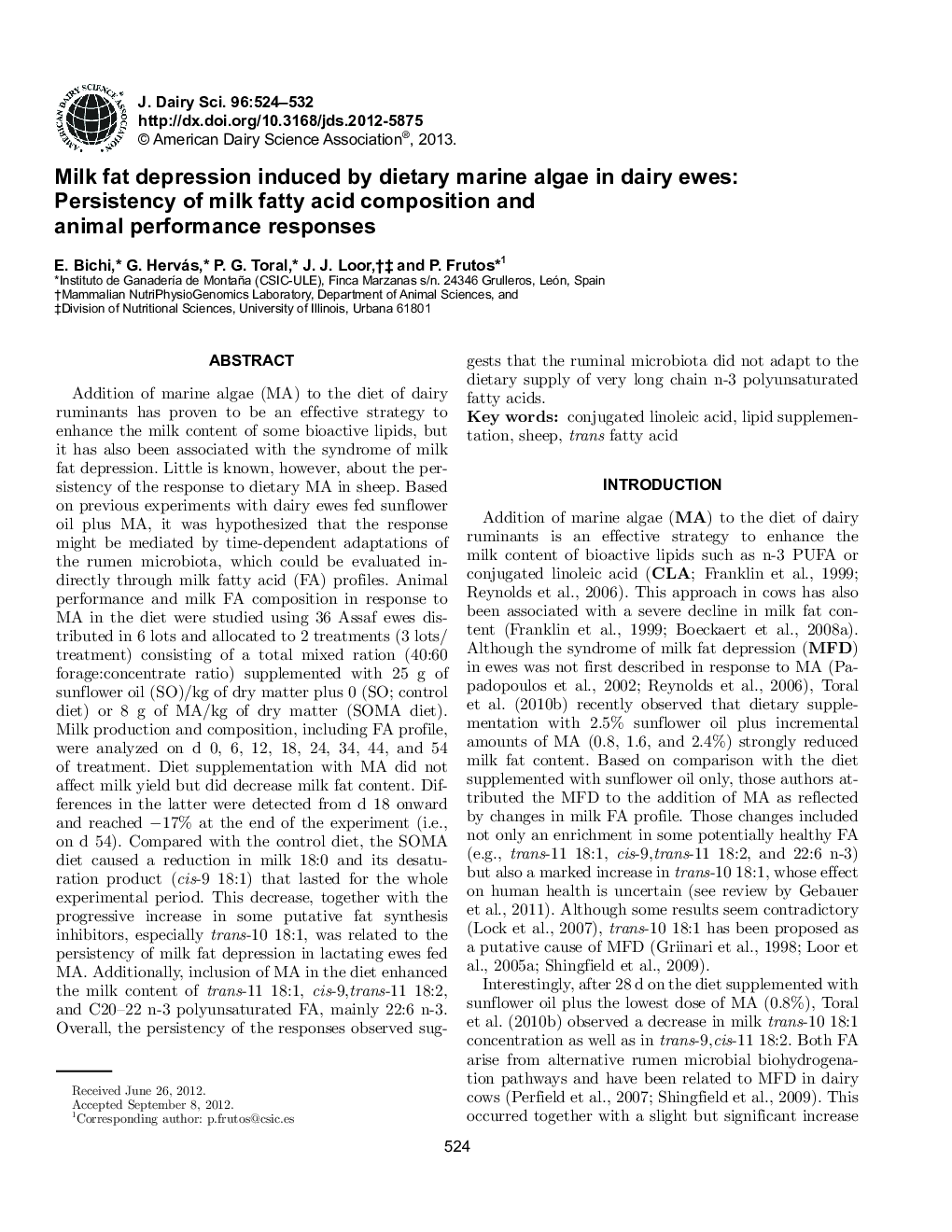| کد مقاله | کد نشریه | سال انتشار | مقاله انگلیسی | نسخه تمام متن |
|---|---|---|---|---|
| 10980613 | 1108071 | 2013 | 9 صفحه PDF | دانلود رایگان |
عنوان انگلیسی مقاله ISI
Milk fat depression induced by dietary marine algae in dairy ewes: Persistency of milk fatty acid composition and animal performance responses
ترجمه فارسی عنوان
افسردگی چربی شیر ناشی از جلبک دریایی در گاوهای شیری: تداوم ترکیب اسید چرب شیر و پاسخ های حیوانی
دانلود مقاله + سفارش ترجمه
دانلود مقاله ISI انگلیسی
رایگان برای ایرانیان
کلمات کلیدی
اسید لینولئیک کانژوگه مکمل لیپید، گوسفند، اسید چرب ترانس،
موضوعات مرتبط
علوم زیستی و بیوفناوری
علوم کشاورزی و بیولوژیک
علوم دامی و جانورشناسی
چکیده انگلیسی
Addition of marine algae (MA) to the diet of dairy ruminants has proven to be an effective strategy to enhance the milk content of some bioactive lipids, but it has also been associated with the syndrome of milk fat depression. Little is known, however, about the persistency of the response to dietary MA in sheep. Based on previous experiments with dairy ewes fed sunflower oil plus MA, it was hypothesized that the response might be mediated by time-dependent adaptations of the rumen microbiota, which could be evaluated indirectly through milk fatty acid (FA) profiles. Animal performance and milk FA composition in response to MA in the diet were studied using 36 Assaf ewes distributed in 6 lots and allocated to 2 treatments (3 lots/treatment) consisting of a total mixed ration (40:60 forage:concentrate ratio) supplemented with 25Â g of sunflower oil (SO)/kg of dry matter plus 0 (SO; control diet) or 8Â g of MA/kg of dry matter (SOMA diet). Milk production and composition, including FA profile, were analyzed on d 0, 6, 12, 18, 24, 34, 44, and 54 of treatment. Diet supplementation with MA did not affect milk yield but did decrease milk fat content. Differences in the latter were detected from d 18 onward and reached â17% at the end of the experiment (i.e., on d 54). Compared with the control diet, the SOMA diet caused a reduction in milk 18:0 and its desaturation product (cis-9 18:1) that lasted for the whole experimental period. This decrease, together with the progressive increase in some putative fat synthesis inhibitors, especially trans-10 18:1, was related to the persistency of milk fat depression in lactating ewes fed MA. Additionally, inclusion of MA in the diet enhanced the milk content of trans-11 18:1, cis-9,trans-11 18:2, and C20-22 n-3 polyunsaturated FA, mainly 22:6 n-3. Overall, the persistency of the responses observed suggests that the ruminal microbiota did not adapt to the dietary supply of very long chain n-3 polyunsaturated fatty acids.
ناشر
Database: Elsevier - ScienceDirect (ساینس دایرکت)
Journal: Journal of Dairy Science - Volume 96, Issue 1, January 2013, Pages 524-532
Journal: Journal of Dairy Science - Volume 96, Issue 1, January 2013, Pages 524-532
نویسندگان
E. Bichi, G. Hervás, P.G. Toral, J.J. Loor, P. Frutos,
